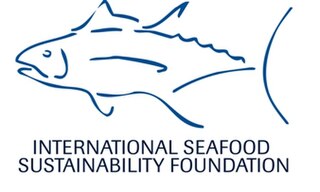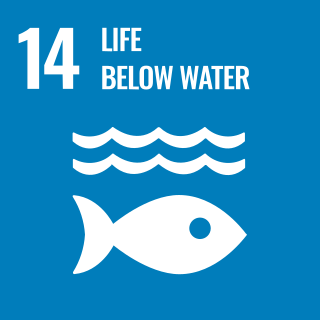
Fishery can mean either the enterprise of raising or harvesting fish and other aquatic life or, more commonly, the site where such enterprise takes place. Commercial fisheries include wild fisheries and fish farms, both in freshwater waterbodies and the oceans. About 500 million people worldwide are economically dependent on fisheries. 171 million tonnes of fish were produced in 2016, but overfishing is an increasing problem, causing declines in some populations.

A conventional idea of a sustainable fishery is that it is one that is harvested at a sustainable rate, where the fish population does not decline over time because of fishing practices. Sustainability in fisheries combines theoretical disciplines, such as the population dynamics of fisheries, with practical strategies, such as avoiding overfishing through techniques such as individual fishing quotas, curtailing destructive and illegal fishing practices by lobbying for appropriate law and policy, setting up protected areas, restoring collapsed fisheries, incorporating all externalities involved in harvesting marine ecosystems into fishery economics, educating stakeholders and the wider public, and developing independent certification programs.

Wildcoast is an international non-profit environmental organization that conserves coastal and marine ecosystems and wildlife.

Blast fishing, fish bombing, dynamite fishing or grenade fishing is a destructive fishing practice using explosives to stun or kill schools of fish for easy collection. This often illegal practice is extremely destructive to the surrounding ecosystem, as the explosion often destroys the underlying habitat that supports the fish. The frequently improvised nature of the explosives used, and undetonated charges, means danger for fishermen and divers as well, with accidents and injuries.

Marine conservation, also known as ocean conservation, is the protection and preservation of ecosystems in oceans and seas through planned management in order to prevent the over-exploitation of these marine resources. Marine conservation is informed by the study of marine plants and animal resources and ecosystem functions and is driven by response to the manifested negative effects seen in the environment such as species loss, habitat degradation and changes in ecosystem functions and focuses on limiting human-caused damage to marine ecosystems, restoring damaged marine ecosystems, and preserving vulnerable species and ecosystems of the marine life. Marine conservation is a relatively new discipline which has developed as a response to biological issues such as extinction and marine habitats change.

Marine ecosystems are the largest of Earth's aquatic ecosystems and exist in waters that have a high salt content. These systems contrast with freshwater ecosystems, which have a lower salt content. Marine waters cover more than 70% of the surface of the Earth and account for more than 97% of Earth's water supply and 90% of habitable space on Earth. Seawater has an average salinity of 35 parts per thousand of water. Actual salinity varies among different marine ecosystems. Marine ecosystems can be divided into many zones depending upon water depth and shoreline features. The oceanic zone is the vast open part of the ocean where animals such as whales, sharks, and tuna live. The benthic zone consists of substrates below water where many invertebrates live. The intertidal zone is the area between high and low tides. Other near-shore (neritic) zones can include mudflats, seagrass meadows, mangroves, rocky intertidal systems, salt marshes, coral reefs, lagoons. In the deep water, hydrothermal vents may occur where chemosynthetic sulfur bacteria form the base of the food web.
Oceana, inc. is a 501(c)(3) nonprofit ocean conservation organization focused on influencing specific policy decisions on the national level to preserve and restore the world's oceans. It is headquartered in Washington, D.C., with offices in Juneau, Monterey, Fort Lauderdale, New York, Portland, Toronto, Mexico City, Madrid, Brussels, Copenhagen, Geneva, London, Manila, Belmopan, Brasilia, Santiago, and Lima, and it is the largest international advocacy group dedicated entirely to ocean conservation.
Ocean Conservancy is a nonprofit environmental advocacy group based in Washington, D.C., United States. The organization seeks to promote healthy and diverse ocean ecosystems, prevent marine pollution, climate change and advocates against practices that threaten oceanic and human life.

Marine conservation activism is the efforts of non-governmental organizations and individuals to bring about social and political change in the area of marine conservation. Marine conservation is properly conceived as a set of management strategies for the protection and preservation of ecosystems in oceans and seas. Activists raise public awareness and support for conservation, while pushing governments and corporations to practice sound ocean management, create conservation policy, and enforce existing laws and policy through effective regulation. There are many different kinds of organizations and agencies that work toward these common goals. They all are a part of the growing movement that is ocean conservation. These organizations fight for many causes including stopping pollution, overfishing, whaling and by-catching, and supporting marine protected areas.
Sustainable seafood is seafood that is caught or farmed in ways that consider the long-term vitality of harvested species and the well-being of the oceans, as well as the livelihoods of fisheries-dependent communities. It was first promoted through the sustainable seafood movement which began in the 1990s. This operation highlights overfishing and environmentally destructive fishing methods. Through a number of initiatives, the movement has increased awareness and raised concerns over the way our seafood is obtained.
Sustainable seafood advisory lists and certification are programs aimed at increasing consumer awareness of the environmental impact and sustainability of their seafood purchasing choices.

International Seafood Sustainability Foundation (ISSF) was formed in 2009 as a global, non-profit partnership among the tuna industry, scientists and World Wide Fund for Nature. The multistakeholder group states its mission is "to undertake science-based initiatives for the long-term conservation and sustainable use of tuna stocks, reducing bycatch and promoting ecosystem health". Regional Fisheries Management Organizations (RFMOs) are primarily responsible for managing the world's tuna stocks—skipjack, yellowfin and albacore tuna, the species most commonly processed for canned and shelf-stable tuna products, but their parliamentary procedures too often allow the short-term economic and political interests of nations to prevent sustainable measures from being adopted. ISSF works to ensure that effective international management practices are in place to maintain the health of all the tuna stocks.
Sustainable sushi is sushi made from fished or farmed sources that can be maintained or whose future production does not significantly jeopardize the ecosystems from which it is acquired. Concerns over the sustainability of sushi ingredients arise from greater concerns over environmental, economic and social stability, and human health.

San Diego-Scripps Coastal Marine Conservation Area (SMCA) and Matlahuayl State Marine Reserve (SMR) are adjoining marine protected areas that extend offshore from La Jolla in San Diego County on California's south coast. The two marine protected areas cover 2.51 square miles (6.5 km2).

Heather Koldewey is the co-founder of Project Seahorse and head of marine and freshwater for the Zoological Society of London-London Zoo Aquarium. She additionally serves as an honorary professor for University of Exeter and a National Geographic explorer. Her research interests focus on marine and freshwater conservation, seahorse biology and genetics, and the impact of the aquarium trade on wild populations of fish and aquatic invertebrates.
The following outline is provided as an overview of and topical guide to fisheries:

Our Seas Our Future (OSOF) is an ENGO group based in New Zealand. OSOF operates as a volunteer driven, non-profit initiative that focuses on coastal and marine conservation advocacy and community engagement projects in New Zealand.
The Cromer Shoal Chalk Beds are a chalk reef off the coast Norfolk in the United Kingdom, believed to be the largest chalk reef in Europe. Since January 2016, an area around it has been designated as a Marine Conservation Zone. Although the MCZ is named after chalk beds off Cromer the most dramatic features are off Sheringham. A chalk bedrock seabed actually extends under much of the Southern North Sea and is exposed underwater and at the shore - as veneers of sand and sediment move with sea action. The chalk is most notably exposed at the shore as rock pools at West Runton. They are home to more than 700 marine species, including a species of purple Hymedesmia sponge unique to the area first identified there in 2011.

Sustainable Development Goal 14 is about "Life below water" and is one of the 17 Sustainable Development Goals established by the United Nations in 2015. The official wording is to "Conserve and sustainably use the oceans, seas and marine resources for sustainable development". The Goal has ten targets to be achieved by 2030. Progress towards each target is being measured with one indicator each.

Sea rewilding is an area of environmental conservation activity which focuses on rewilding, restoring ocean life and returning seas to a more natural state. Sea rewilding projects operate around the world, working to repopulate a wide range of organisms, including giant clams, sharks, skates, sea sturgeons, and many other species. Rewilding marine and coastal ecosystems offer potential ways to mitigate climate change and sequester carbon. Sea rewilding projects are currently less common than those focusing on rewilding land, and seas are under increasing stress from the blue economy – commercial activities which further stress the marine environment. Rewilding projects held near coastal communities can economically benefit local businesses as well as individuals and communities a whole.















